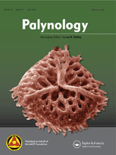
PALYNOLOGY
Scope & Guideline
Revealing Evolutionary Secrets Embedded in Fossils
Introduction
Aims and Scopes
- Pollen Morphology and Taxonomy:
Research focusing on the morphological characteristics of pollen grains as a means to identify plant species and understand their taxonomic relationships. - Palynostratigraphy:
Studies aimed at establishing the chronological sequence of sedimentary layers based on the distribution of palynomorphs, contributing to geological and paleoclimatic reconstructions. - Paleoecology and Environmental Reconstruction:
Investigations that utilize palynological data to reconstruct past environments and climate conditions, providing insights into ecological changes over geological time. - Melissopalynology:
Research that examines pollen content in honey to understand bee foraging behavior and the ecological dynamics of pollinator-plant interactions. - Biostratigraphy of Dinoflagellates and Acritarchs:
Focus on the classification and stratigraphic significance of dinoflagellate cysts and acritarchs, contributing to the understanding of marine and freshwater ecosystems through different geological periods. - Human Impact Studies:
Explorations of how human activities have altered palynological records, impacting vegetation and biodiversity in various regions.
Trending and Emerging
- Climate Change and Ecological Responses:
A growing number of studies are focusing on the impacts of climate change on pollen distribution and vegetation dynamics, emphasizing the role of palynology in understanding contemporary ecological shifts. - Applications of Advanced Imaging Techniques:
The use of cutting-edge techniques, such as scanning electron microscopy and confocal laser scanning microscopy, in pollen analysis is on the rise, providing deeper insights into pollen morphology and its implications for taxonomy. - Palynology in Agroecosystems:
Emerging research is increasingly examining the interactions between pollen sources and agricultural practices, including the foraging behavior of bees and other pollinators in agroecosystems, highlighting the importance of biodiversity in food production. - Paleoenvironmental Studies using High-Resolution Data:
There is an increasing trend in utilizing high-resolution palynological data to reconstruct detailed paleoenvironmental conditions, reflecting a shift towards more nuanced and precise reconstructions of past climates and ecosystems. - Interdisciplinary Approaches:
Recent publications show a trend towards integrating palynology with other scientific disciplines, such as molecular biology, ecology, and environmental science, enhancing the multidisciplinary nature of palynological research.
Declining or Waning
- Traditional Palynological Techniques:
There has been a noticeable decrease in papers emphasizing traditional methods of palynological analysis, such as basic morphological descriptions, as researchers increasingly adopt advanced imaging techniques and molecular methods. - Nomenclature Debates:
Although nomenclature issues were once a significant topic within the journal, recent publications indicate a reduced emphasis on debates surrounding taxonomic naming conventions and nomenclatural updates. - General Flora Surveys:
The prevalence of broad surveys of local flora based solely on palynological analysis appears to be declining, possibly due to the increasing preference for studies that integrate molecular data and ecological assessments.
Similar Journals
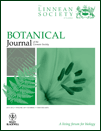
BOTANICAL JOURNAL OF THE LINNEAN SOCIETY
Cultivating Insights into Plant Biology and EcosystemsThe Botanical Journal of the Linnean Society, published by Oxford University Press, stands as a premier platform for interdisciplinary research within the realms of Ecology, Evolution, Behavior, and Plant Science. With a notable impact factor reflective of its esteemed reputation, this journal is classified in the Q1 quartile for both Ecology and Plant Science, placing it among the most influential publications in these fields. Since its inception in 1969, and with an anticipated convergence of research extending to 2024, it has become essential for scholars and professionals seeking to engage with cutting-edge studies, theoretical frameworks, and practical applications that drive our understanding of plant biology and ecological systems. The journal’s commitment to excellence is underscored by its robust Scopus rankings—achieving an impressive 83rd percentile in Ecology and a 82nd percentile in Plant Science. This makes the Botanical Journal of the Linnean Society a crucial resource for researchers, educators, and students alike, eager to advance their knowledge and contribute to the evolving discourse in botany and environmental studies.
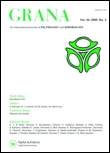
GRANA
Pioneering Research in the Heart of Ecology and BotanyGRANA is a prestigious peer-reviewed journal published by Taylor & Francis AS, dedicated to advancing the field of Ecology and Plant Science. With a history dating back to the early 1970s and continuing through to 2024, GRANA serves as a critical platform for researchers and professionals exploring the intricate relationships within plant communities, ecological dynamics, and evolutionary processes. Despite its Q3 quartile ranking in both Ecology, Evolution, Behavior and Systematics and Plant Science, it stands out for its rigorous publication standards and relevance in the scientific community. The journal holds a rank of #283/516 in Plant Science and #410/721 in Ecology, reflecting its commitment to producing impactful research. Although it currently does not offer an open access model, GRANA provides vital insights that are indispensable for academics, practitioners, and students eager to deepen their understanding of ecological and botanical sciences.
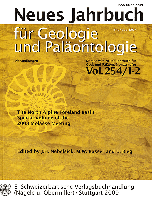
NEUES JAHRBUCH FUR GEOLOGIE UND PALAONTOLOGIE-ABHANDLUNGEN
Bridging the Past and Present of Planetary ScienceNEUES JAHRBUCH FUR GEOLOGIE UND PALAONTOLOGIE-ABHANDLUNGEN, published by E SCHWEIZERBARTSCHE VERLAGSBUCHHANDLUNG, is a distinguished scholarly journal based in Germany that has made significant contributions to the field of Earth and Planetary Sciences with a particular emphasis on Paleontology. With its ISSN: 0077-7749, this journal provides an essential platform for researchers, professionals, and students to explore cutting-edge research and developments that enhance our understanding of geological and paleontological processes. Boasting a robust ranking of #67 out of 113 in Scopus for the category of Earth and Planetary Sciences and achieving a Q3 quartile ranking in Paleontology, it stands as a significant resource in the global academic community. Though not an open-access journal, it offers valuable insights from 1987 onwards, ensuring a comprehensive archive of high-quality research articles published from 1995 to 2024. Its scholarly impact continues to resonate, making it a vital reference point for advancements in the ever-evolving disciplines of geology and paleontology.

JOURNAL OF THE PALAEONTOLOGICAL SOCIETY OF INDIA
Advancing Research in Earth's Ancient PastThe JOURNAL OF THE PALAEONTOLOGICAL SOCIETY OF INDIA, published by SAGE PUBLICATIONS INDIA PVT LTD, stands as a significant resource in the field of paleontology, dedicated to disseminating high-quality research and findings from the Indian subcontinent and globally. With an ISSN of 0552-9360, this journal has established itself within the academic community, particularly as it converges its publication years from 2011 to 2024. Ranking in the Q4 category of paleontology as of 2023, it serves an essential niche for researchers and students interested in the historical biological records and evolutionary processes. Despite its current Scopus ranking of #88 out of 113 in the Earth and Planetary Sciences category, the journal plays a pivotal role in fostering scholarly dialogue and advancing the understanding of paleontological sciences in India and beyond. Researchers are encouraged to contribute to this evolving field and share their findings, solidifying the journal's commitment to highlighting significant paleontological research contributions.
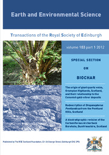
Earth and Environmental Science Transactions of the Royal Society of Edinburgh
Advancing knowledge for a sustainable future.Earth and Environmental Science Transactions of the Royal Society of Edinburgh is a prestigious journal published by Cambridge University Press, dedicated to advancing research in the field of Earth and planetary sciences, as well as environmental science. With its ISSN 1755-6910 and E-ISSN 1755-6929, the journal has established itself as a crucial platform for disseminating innovative research and comprehensive reviews since its inception in 2007. Positioned in the Q3 quartile for both Earth and Planetary Sciences and Environmental Science, it contributes significantly to the ongoing dialogue and development in these areas, boasting a Scopus ranking that reflects its commitment to scholarly excellence with an emphasis on interdisciplinary approaches and real-world applications. The journal is based in the United Kingdom, with its editorial office located at the Edinburgh Building, Shaftesbury Road, Cambridge. As an essential resource for researchers, professionals, and students alike, Earth and Environmental Science Transactions offers opportunities for open discourse on pressing environmental challenges, fortifying its role in fostering a deeper understanding of our planet's systems and their interconnectedness.

PALEONTOLOGICAL JOURNAL
Exploring Earth's Ancient Secrets.The PALEONTOLOGICAL JOURNAL, published by PLEIADES PUBLISHING INC, is a premier platform for the dissemination of research in the field of paleontology. With an ISSN of 0031-0301 and E-ISSN 1555-6174, this journal serves the academic community by providing insights into fossil studies, evolutionary biology, and the historical narrative of life on Earth. Despite being categorized in the Q3 quartile for 2023 and currently holding a Scopus rank of #84 out of 113 in the Earth and Planetary Sciences- Paleontology category, it remains a valuable resource for researchers and practitioners. The journal's coverage spans from 1990 to 2024, offering a comprehensive historical perspective while also addressing contemporary issues in paleological research. Scholars and students alike benefit from its rigorous peer-reviewed articles and the opportunity to access vital knowledge in the ever-evolving field of paleontology.

PALAEONTOGRAPHICA ABTEILUNG A-PALAOZOOLOGIE-STRATIGRAPHIE
Innovative Perspectives: Bridging Paleontology and StratigraphyPalaeontographica Abteilung A-Palaozoologie-Stratigraphie is a prominent academic journal that serves as a vital resource for researchers in the fields of Paleontology and Stratigraphy. Published by E Schweizerbart'sche Verlagsbuchhandlung in Germany, this journal has been instrumental in disseminating cutting-edge research from 1996 to 2024. With an established reputation highlighted by its Q3 ranking in both Paleontology and Stratigraphy, it ranks 26th among 113 journals in Paleontology and 15th among 55 in Stratigraphy, showcasing its significance within the scientific community. Although it does not currently offer open access, the journal provides an invaluable platform for the exchange of innovative ideas and findings in paleobiological and stratigraphic studies. As such, Palaeontographica continues to attract contributions from leading academics, making it an indispensable publication for professionals and students alike who are eager to advance their understanding of Earth's historical biological and geological patterns.
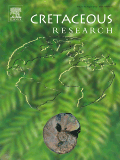
CRETACEOUS RESEARCH
Illuminating the Cretaceous Period's Rich TapestryCRETACEOUS RESEARCH, published by Academic Press Ltd - Elsevier Science Ltd, is a leading journal in the field of Paleontology that has established itself as an essential resource for researchers and professionals delving into the rich tapestry of the Cretaceous period. With its ISSN 0195-6671 and E-ISSN 1095-998X, this journal boasts a prestigious placement in the academic landscape, holding a Q1 rank in the 2023 Paleontology category and proudly positioned at 21st out of 113 in the Scopus ranking, reflecting its impact factor that places it in the 81st percentile. Since its inception in 1980, CRETACEOUS RESEARCH has facilitated a deeper understanding of prehistoric life and its evolutionary processes, covering topics such as fossil discoveries, paleoecology, and biostratigraphy. This journal best serves those seeking to expand their knowledge and contribute innovative findings to the scientific discourse surrounding the Cretaceous era. As it continues to converge into the future until 2025, it remains dedicated to providing an open platform for the dissemination of high-quality research that shapes our understanding of Earth’s geological past.
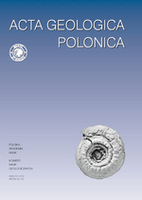
ACTA GEOLOGICA POLONICA
Innovative research shaping the landscape of geology.ACTA GEOLOGICA POLONICA is a distinguished journal published by the Polska Akademia Nauk, in collaboration with the University of Warsaw's Geology Department. Since its inception, it has served as a vital platform for disseminating innovative research in the field of Geology, reflecting a commitment to advancing scientific knowledge in Earth and planetary sciences. With an ISSN of 0001-5709 and an E-ISSN of 2300-1887, this journal provides a rigorous review process and is classified in the Q3 quartile for Geology as of 2023, indicating its growing influence in the discipline. Despite not being open access, the journal facilitates meaningful contributions that span a range of geological topics from fundamental research to applied sciences, thereby enriching the academic landscape. Researchers, professionals, and students alike are encouraged to engage with the valuable findings and discussions contained within its pages, which continue to shape the future of geological inquiry.
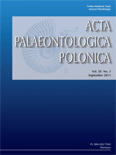
ACTA PALAEONTOLOGICA POLONICA
Advancing Knowledge in Paleontological SciencesACTA PALAEONTOLOGICA POLONICA is a leading scholarly journal in the field of paleontology, published by the Institute of Paleobiology, Polish Academy of Sciences. With its open access model established since 1956, the journal ensures that vital research related to Earth's history and the evolution of life is freely accessible to a global audience. Based in Warsaw, Poland, this journal has garnered a respectable impact within the academic community, currently positioned in the Q2 quartile of its field and ranking #47 out of 113 in Scopus for Earth and Planetary Sciences, reflecting its significance in advancing paleontological research. Covering a wide range of topics related to fossil studies and evolutionary biology, ACTA PALAEONTOLOGICA POLONICA serves as a crucial platform for researchers, professionals, and students alike, encouraging the dissemination of innovative ideas and discussions that contribute to our understanding of past life on Earth. As it continues to publish high-quality articles through to 2024 and beyond, this journal remains integral to the ongoing discourse in paleontological sciences.